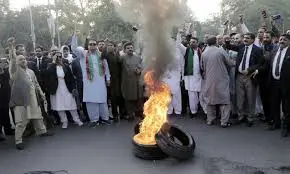UK parliamentary study warns Kashmir flash point could spark nuclear conflict
A 42 page research briefing released by the UK Parliament this week accuses India of adopting an increasingly aggressive posture toward Pakistan and cautions that the unresolved Kashmir dispute could ignite a nuclear war in South Asia.
The document traces the latest crisis from the 22 April killings in Pahalgam, Indian administered Kashmir, to the cease fire brokered on 10 May. It singles out India’s overnight air and missile strikes of 6–7 May as the decisive trigger for a rapid escalation that saw both sides exchange heavy fire until international mediators intervened.
According to the briefing, New Delhi blamed Islamabad for the Pahalgam incident without presenting evidence and launched cross border attacks that hit civilian areas and Pakistani military sites in both Pakistan administered Kashmir and mainland Pakistan.
Islamabad, which denied involvement and called for an independent inquiry, responded with retaliatory strikes and vowed to meet any future aggression “in kind.”
The confrontation widened as India suspended bilateral trade, sealed land borders and threatened to revoke the Indus Waters Treaty. Pakistan responded with reciprocal measures and hinted at shelving the 1971 Simla Agreement.
Parliamentary researchers conclude that Pakistan “showed restraint within the bounds of international law,” while India relied on “force, threats and accusations,” exacerbating regional instability. The report criticizes India for ignoring United Nations resolutions on Kashmir and rejecting mediation offers from the United States, the United Kingdom and other powers.
Analysts quoted in the study argue that invoking the Pahalgam attack fits a historical pattern in which India, seeking to entrench its control of Kashmir, frames the conflict as counter terrorism while resisting outside involvement.
They warn that the fundamental dispute India’s claim that Pakistan supports militants versus Pakistan’s charge of Indian repression in Kashmir remains unresolved despite the cease fire, leaving the region poised for another, potentially faster escalation.
Read more
Leaked documents allegedly reveal RAW’s role in Pahalgam attack
The report also faults Washington and London for an initially “sluggish” response, noting that U.S. back channel diplomacy eventually helped secure the 10 May truce but did not persuade India to accept an external role in future talks.
With both nations armed with nuclear weapons, the study urges the international community to take “robust, proactive measures” to deter further hostilities, cautioning that any repeat of the May confrontation could have catastrophic consequences.
For the latest news, follow us on Twitter @Aaj_Urdu. We are also on Facebook, Instagram and YouTube.























Comments are closed on this story.